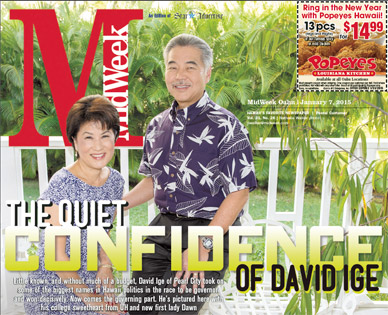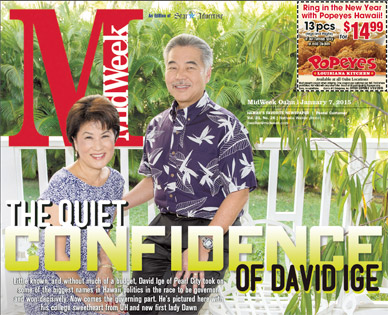The Quiet Confidence Of David Ige
“I was very active,” Ige admits.
Whatever the reason, Ige graduated fifth in Pearl City’s High School’s 500-member Class of 1975. He was named “Scholar-Athlete” of the year.
When Ige applied for colleges and scholarships, Ishihara wrote recommendations for him.
mw-cover-010715
Little known, and without much of a budget, David Ige of Pearl City took on some of the biggest names in Hawaii politics in the race to be governor, and won decisively. Now comes the governing part. He's pictured here with his college sweetheart from UH and new first lady Dawn | Nathalie Walker photo nwalker@midweek.com
“He was turned down for one of the scholarships I was certain he’d get,” Ishihara remembers. “I called them up and asked why he’d been turned down, whether my letter had been badly written or what. The woman said, ‘No, we just thought he sounded too good to be true.'”
With eyes on a degree in engineering, Ige applied to a number of colleges and universities. Along with University of Hawaii, Massachusetts Institute of Technology, Harvey Mudd College, University of California-Berkeley and Carnegie-Mellon University all accepted him. Ige chose to attend University of Hawaii.
“I didn’t tell my parents about the Mainland schools,” Ige admits. “We were a middle-class family. They’d already sent two of my older brothers to schools on the Mainland, and I had a younger brother who was going to need help. I didn’t want to burden my parents.”
So Ige began the life of a University of Hawaii student, carpooling to Manoa from Pearl City. “We had 7:30 classes, so my friends and I had to leave early,” he remembers.
“Rather than work during the school year, I put in four summers at Dole Cannery. We tried to get the night shift, because there was a better chance to get some overtime. I finished in four years. I loved it at the university.”
And there he found a wife. At the end of his sophomore year, Ige ran for the Engineering School’s seat in the Associated Students of the University of Hawaii. He was part of a ticket called “Pride.” The ticket’s candidate from the College of Arts and Sciences was a journalism major and Campbell High School graduate named Dawn Amano.
“I first met David in a conference room in Porteus Hall at a candidates meeting,” says Dawn Ige. “I remember his loud laugh. We campaigned together, and he asked me out.” They went to see a Disney movie, and afterward ate at Coco’s. “He talked a lot, and I was interested in what he had to say. We dated steadily for the next five years.” They married in 1982.
Ige’s penchant for activism persisted during his undergraduate years at Manoa. He served as ASUH’s secretary, as an officer in several student organizations, and as treasurer and vice president of his fraternity.
His schoolwork didn’t suffer. Ige graduated in spring of 1979 with a Bachelor of Science degree in electrical engineering “with distinction.”
The newly minted electrical engineer received 41 job offers, all but one of which came from the Mainland. Ige took that one, with Pacific Analysis Corporation, an engineering outfit under contract to the Commander of the Third Fleet at Pearl Harbor.
“David has strong ties to the state of Hawaii,” says Dawn Ige. “It’s his home. He went to the university here, and he turned down good job offers on the Mainland. I know it’s a cliché, but I think David’s in love with the state of Hawaii.”
Two years later, Ige moved to Hawaiian Telcom, at that time primarily a phone company.
“My goal was to become Hawaiian Tel’s first local president,” he remembers.
It looked as if he might make it.
“In the first four years I was with the company I was promoted three times,” he recalls, “ultimately to supervising engineer.”
Hawaiian Tel executives also tapped him for the company’s executive replacement program.
Then, early the Friday following Thanksgiving 1985, high school classmate Keith Hiraoka called. “Arnold Morgado had resigned his seat in the state House to run for City Council. Keith asked if I’d be interested in filling the vacancy. I said no. I was oblivious to politics. I didn’t know or care anything about it.







